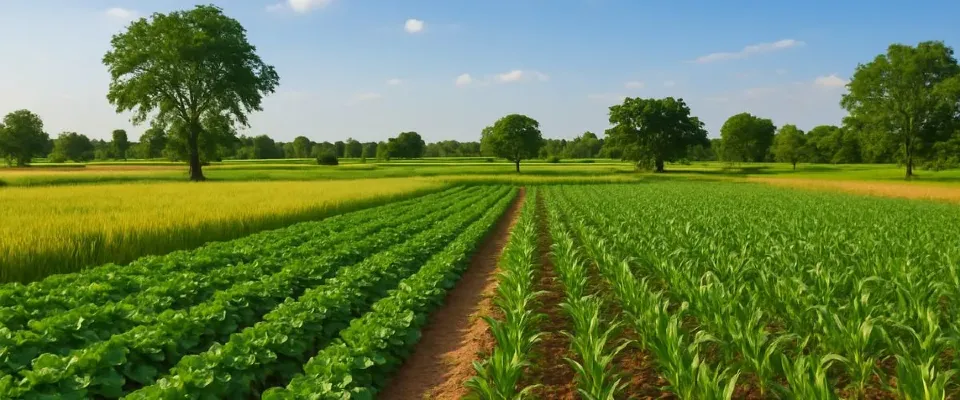
As urban real estate markets continue to experience saturation, smart investors are turning their attention toward an age-old yet increasingly lucrative asset: farmland. With its ability to provide both long-term appreciation and consistent passive income, farmland investing is rapidly emerging as a strong contender in the alternative investment space.
If you are looking to invest in farmland—whether as a first-time buyer or a seasoned investor seeking portfolio diversification—this guide will walk you through everything you need to know about buying farmland for investment, with a special focus on farmland investment near Bangalore, one of the most promising regions in India.
India’s agrarian roots, rising demand for organic produce, and shift toward wellness-oriented lifestyles are pushing more investors to consider farmland investment as a strategic long-term move. The reasons are compelling:
1. Tangible Asset with Long-Term Value
Unlike volatile stocks or intangible digital assets, farmland is a physical, appreciating asset. Land is finite, and as urban areas expand, the value of agricultural land—especially near metros like Bangalore—is only increasing.
2. Consistent Returns
When managed well, farmland investments can yield annual returns through agricultural produce, timber harvesting, or leasing to farmers. Managed farmlands can generate 8–15% annual returns depending on the crop and operational efficiency.
3. Tax Benefits
In India, income from agricultural activities is largely tax-exempt. This gives farmland investing an edge over other forms of real estate or fixed-income instruments.
4. Portfolio Diversification
Farmland performs differently than equities or gold, making it a valuable tool for portfolio diversification. It provides a hedge against inflation and economic downturns.
Step 1: Define Your Investment Goals
Start by answering key questions:
Your goals will determine the type, size, and location of the farmland you should buy.
Step 2: Understand Legal Eligibility
In many Indian states, purchasing agricultural land is restricted to registered farmers or people who meet certain income or agricultural background criteria. However, states like Karnataka have eased these restrictions.
For example, Karnataka removed the income ceiling in 2020, allowing non-farmers to invest in farmland under certain conditions—making it easier for city dwellers to explore farmland investment near Bangalore.
Always consult with a legal expert or an experienced farmland investing platform like Estatebull to ensure compliance.
Step 3: Choose the Right Location
Location is key to any real estate investment, and farmland is no different.
Here are a few things to consider:
Regions score high on all these factors, making them a strategic choice for first-time farmland buyers.
Step 4: Choose Between Managed and Unmanaged Farmland
One of the most important decisions is whether to go for managed farmland or do-it-yourself farmland.
Managed Farmland
These are properties where a professional agency manages all farming activities, infrastructure, irrigation, and crop planning. You get:
Platforms like EstateBull, a leading farmland investing platform, offer curated solutions where you can enjoy ownership and returns without getting into daily operations.
Unmanaged Farmland
This involves direct land ownership with self-management. It provides more control but also requires time, knowledge, and resources.
Step 5: Conduct Due Diligence
Before finalizing your farmland investment, thoroughly check:
Due diligence ensures that the land is free from litigation, unauthorized encroachments, or pending loans. EstateBull ensures all legal verifications are handled on behalf of the investor, giving you peace of mind.
Step 6: Registration and Documentation
Once you have identified the land and completed all checks, you’ll proceed with:
Some investors prefer to hold farmland as part of a trust or LLP for better management and asset planning.
Step 7: Stay Involved or Stay Informed
If you choose managed farmland, platforms like Estatebull provide real-time tracking of farming activities, crop cycles, harvests, and even revenue distribution through dashboards or periodic reports.
For DIY farmland, consider hiring a local farm manager or at least visit periodically to ensure maintenance and productivity.
At Estatebull, we believe that to invest in farmland should be simple, secure, and sustainable. As one of India’s most reliable platforms for farmland , we offer:
Our projects like Nandi Farms have received excellent response from investors across India. Whether youlooking for a long-term wealth-building tool or a nature-based lifestyle investment, Estatebull’s farmland investing platform** is crafted for your success.
How to Invest in Farmland?
First, decide why you want to invest—steady income, land value growth, or both. Check the state rules; in Karnataka, even non-farmers can buy farmland. Pick a place with good soil, water, and road access. Choose between managed farmland (experts handle everything) or unmanaged (you do it yourself). Always check the land papers and register it properly.
What are Benefits of Investing in Farmland?
Farmland is a safe asset that usually increases in value. It can give you regular income from crops or leasing, often 8–15% yearly. Farm income is mostly tax-free, and land protects against inflation. You can also use it for weekend getaways.
Is Farmland a Good Investment?
Yes, if you choose the right land. It is more stable than stocks and can give steady income plus long-term growth. Near Bangalore, demand is rising because of city expansion, organic farming, and nature-based living.
What are Tax Benefits of Buying Farmland in India?
Farm income is tax-free in India. Rural farmland is not counted for wealth tax, and selling it usually doesn’t attract capital gains tax. For urban farmland, rules may differ, so check with a tax expert.